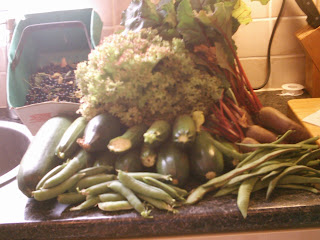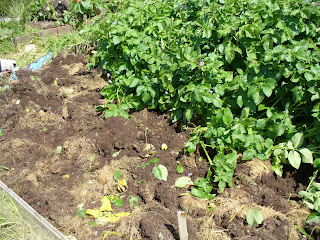It has been 6 years since we moved from Coventry to begin what we hoped would be a self-sufficient life. We wanted to buy a house outright and not pay a mortgage. Pay off our overdrafts and live within our means. Well.... old habits die hard. But we have stuck to our dream of growing our own food.... it doesn't last all year, it takes time of course, but it does supplement the supermarket shop and there are weekends when we are very nearly self sufficient (damn those chocolate cravings...)
When I was little my Dad subscribed to a weekly magazine called 'Grow Your Own'. He collected each issue in a 1970's brown binder and built 2 polytunnels in the garden. That summer, I was introduced to a new world, an alternate climate with the strong smell of tomato leaves and courgette plants like something from 'Invasion of the Body Snatchers'. The atmosphere in that tunnel still comes back to me regularly in dreams, I'm not sure what significance it has but its had a lasting effect.
Since then I have always wanted to get a polytunnel - finally, 6 years after moving to our own home, we have got one!
 |
| Inside the polytunnel |
Apart from my Dad's magazines my past experience of 'growing my own' was in our garden and greenhouse in Coventry and later on our alotment (which also features often in my dreams - for some reason I keep going back there years later to see what still might be growing...)
 |
| The garden path in Coventry, tulips on the left, leeks on the right. |
The alotment was an invaluable place to learn hands on, thanks to all the retired people who now worked full time on their plots. I must have been listening because the first harvest from the alotment was abundant and delicious.
Growing in the Outer Hebrides however is quite a different game. There are a number of additional pests that we encountered which weren't native to the Midlands, first and foremost sheep, then cows and by my own doing, chickens. The chickens were our own to take responsibility for, but the cows and sheep were from next door and harder to come to terms with.
The first thing we put in, back in 2009, was our 'poo bed'. I had been reading a book on permaculture - a way of growing where the idea is to work alongside nature; rather than trying to constantly tame and shape it, you can put in less effort by going with nature's flow.
I shuttered off a large section of ground in the old hay drying area on the croft - it has 3ft walls and provides some good shelter from the worst of the gales.
Then I lined the base of the raised beds with old newspapers, wheelbarrowed over from the shop accross the road. The idea is that instead of digging over a matted grassy area, you put a layer of weed retardent down first, then fill it with dung and plant potatoes into plugs of soil that sit within the manure. The you cover the whole thing in either more soil, or in my case, bags and bags of grass clippings dropped off by a local garden maintenance firm.
The result is odd looking but it saves a lot of digging.
 |
| Potatoes growing through the grass clippings mulch |
It worked very well indeed. the mulch retains the moisture which potatoes need a lot of.
When the plants have flowered its supposed to be the right time to dig them up.
You don't need to turn the soil over completely once you've got all the potatoes out, because it will all rot down, and the paper will biodegrade to make a good nutrient rich patch again next year.
It is such a wonderful feeling digging up potatoes, like funding golden nuggets.
 |
| Laying the potatoes out in the sun to dry |
The potatoes nearly didn't happen at all though, due to an infestation of cows at an early stage. I had set up the raised bed, planted the potatoes and covered it all in grass clippings. I had put together a fence from, here's the error,
old fence wire and posts and the smell of silage wafting accross to next doors field must have been too much for the old dears. As soon as I popped inside for a well earned cup of tea, they nipped through the gap between us and next door and were in like a shot. They walked through my fence as if it wasn't there and I returned to the patch 20 minutes later to see them chomping down a large mouthful of grass clippings and seed potatoes each.
There is a reason we have gun laws in this country, that afternoon I nearly made a whole lot of beef burgers.
The next day Mark put up a proper fence for me.
After the initial teething trouble, the poo bed worked well for other crops too.
Courgettes and onions did well with its rich mulch protection.
Just as things were growing well we fell victim to the next infestation. I had planted runner beans, sweetcorn and strawberries in beds surrounding the poo bed. When I found next doors sheep in there one day, the air turned blue. It looked as though someone had been at everything with a strimmer. They had completely mascerated the sweetcorn and just left the stalks
 |
| Sheep damage, note they left the rhubarb alone, the leaves are poisonous to them - shame |
I had been so looking forward to runner beans, simply boiled and covered in real butter. The sheep beat me to it.
 |
| Runner has beans |
In Coventry the men at the alotment built huge runner bean walls, like something from the world war trenches. There was such a glut of them every year you grew tired of them.... until one day you just can't grow them.
To be honest, while we still managed to get a harvest from some things, that year was a huge knock to our confidence of growing. We had hoped we could get straight into the soil before tackling the larger, harder problems of fencing on the croft. We had learned the hard way that sheep are evil, they can jump old fences and the only way to help yourself is to barricade with barbed wire and 6ft posts!
 |
| Fencing, you can't have enough of it |
After that we stuck to growing outdoors, but under cover. the community skips prove to be a valuable resource for anyone used to an alotment style of growing, where any old bit of tat can be put to good use.
Old bed frames proved to be the most effective. Especially when they were thrown away next to the packaging plastic that the new bed's mattress came in! We have quite a few of them after regularly keeping an eye on the community skip, they are great for courgettes.
Pallets also prove to be effective sheep protection. This potato box had netting over the top to keep the chickens off, then when it came to harvest time you just pull down the walls and the potatoes fall out. It doesnt look pretty I know, but I do functional gardening, I'm not bothered about aesthetic!
In 2012 I did more potatoes in the pallet pen and for the first time broad beans. They benefit from the shelter of the pallet walls, but still get enough sunshine to grow.
 |
| Turnips under a bed frame cloche |
At last we had done enough fencing to <mostly> keep the sheep out. It has taken a lot of swearing and realisation that sheep will wait until you have grown something before they show you where your weaknesses are. But finally we have started to get our harvests back up to an alotment level.
2013 is the year of the Polytunnel though....we are hoping for great things.....



































































